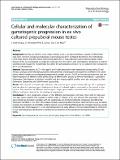Por favor, use este identificador para citar o enlazar a este item:
http://hdl.handle.net/10261/156613COMPARTIR / EXPORTAR:
 SHARE SHARE
 CORE
BASE CORE
BASE
|
|
| Visualizar otros formatos: MARC | Dublin Core | RDF | ORE | MODS | METS | DIDL | DATACITE | |

| Título: | Cellular and molecular characterization of gametogenic progression in ex vivo cultured prepuberal mouse testes |
Autor: | Isoler-Alcaraz, J. CSIC; Fernández-Pérez, Daniel CSIC ORCID ; Larriba, E. CSIC ORCID; Del Mazo, Jesús CSIC ORCID | Palabras clave: | Spermatogenesis Ex vivo culture Gametogenic progression Testis Meiosis microRNA |
Fecha de publicación: | 18-oct-2017 | Editor: | BioMed Central | Citación: | Reproductive Biology and Endocrinology 15(1): 85 (2017) | Resumen: | [Background]
Recently, an effective testis culture method using a gas-liquid interphase, capable of differentiate male germ cells from neonatal spermatogonia to spermatozoa has been developed. Nevertheless, this methodology needs deep analyses that allow future experimental approaches in basic, pathologic and/or reprotoxicologic studies. Because of this, we characterized at cellular and molecular levels the entire in vitro spermatogenic progression, in order to understand and evaluate the characteristics that define the spermatogenic process in ex vivo cultured testes compared to the in vivo development. [Methods] Testicular explants of CD1 mice aged 6 and 10 days post-partum were respectively cultured during 55 and 89 days. Cytological and molecular approaches were performed, analyzing germ cell proportion at different time culture points, meiotic markers immunodetecting synaptonemal complex protein SYCP3 by immunocytochemistry and the relative expression of different marker genes along the differentiation process by Reverse Transcription - quantitative Polymerase Chain Reaction. In addition, microRNA and piwi-interactingRNA profiles were also evaluated by Next Generation Sequencing and bioinformatic approaches. [Results] The method promoted and maintained the spermatogenic process during 89 days. At a cytological level we detected spermatogenic development delays of cultured explants compared to the natural in vivo process. The expression of different spermatogenic stages gene markers correlated with the proportion of different cell types detected in the cytological preparations. [Conclusions] In vitro progression analysis of the different spermatogenic cell types, from both 6.5 dpp and 10.5 dpp testes explants, has revealed a relative delay in relation to in vivo process. The expression of the genes studied as biomarkers correlates with the cytologically and functional detected progression and differential expression identified in vivo. After a first analysis of deep sequencing data it has been observed that as long as cultures progress, the proportion of microRNAs declined respect to piwi-interactingRNAs levels that increased, showing a similar propensity than which happens in in vivo spermatogenesis. Our study allows to improve and potentially to control the ex vivo spermatogenesis development, opening new perspectives in the reproductive biology fields including male fertility. |
Versión del editor: | http://dx.doi.org/10.1186/s12958-017-0305-y | URI: | http://hdl.handle.net/10261/156613 | DOI: | 10.1186/s12958-017-0305-y | ISSN: | 1477-7827 |
| Aparece en las colecciones: | (CIB) Artículos |
Ficheros en este ítem:
| Fichero | Descripción | Tamaño | Formato | |
|---|---|---|---|---|
| 12958_2017_Article_305.pdf | 2,94 MB | Adobe PDF |  Visualizar/Abrir |
CORE Recommender
PubMed Central
Citations
11
checked on 08-abr-2024
SCOPUSTM
Citations
18
checked on 18-abr-2024
WEB OF SCIENCETM
Citations
17
checked on 24-feb-2024
Page view(s)
335
checked on 18-abr-2024
Download(s)
226
checked on 18-abr-2024

